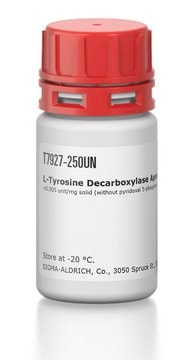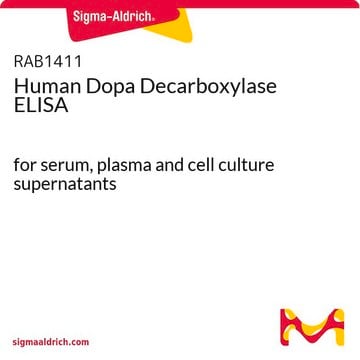T7677
L-Tyrosine Decarboxylase from Streptococcus faecalis
≥0.1 unit/mg solid
Sinónimos:
L-Tyrosine carboxy-lyase
Iniciar sesiónpara Ver la Fijación de precios por contrato y de la organización
About This Item
Productos recomendados
form
powder
specific activity
≥0.1 unit/mg solid
storage temp.
−20°C
¿Está buscando productos similares? Visita Guía de comparación de productos
Application
L-Tyrosine decarboxylase from Streptococcus faecalis has been used in a study to isolate and identify the carbonyl-active site of diamine oxidase by gas chromatographic mass spectrometry. L-Tyrosine decarboxylase from Streptococcus faecalis has also been used in a study to investigate the adsorption of Streptococcus faecalis on diatomite carriers for use in biotransformations.
Other Notes
Dried cells from which activity can be extracted.
Unit Definition
One unit will cause the decomposition of 1.0 μmole of L-tyrosine per min at pH 6.2 at 37 °C.
Storage Class
11 - Combustible Solids
wgk_germany
WGK 3
flash_point_f
Not applicable
flash_point_c
Not applicable
ppe
Eyeshields, Gloves, type N95 (US)
Certificados de análisis (COA)
Busque Certificados de análisis (COA) introduciendo el número de lote del producto. Los números de lote se encuentran en la etiqueta del producto después de las palabras «Lot» o «Batch»
¿Ya tiene este producto?
Encuentre la documentación para los productos que ha comprado recientemente en la Biblioteca de documentos.
W A Anderson et al.
Journal of chemical technology and biotechnology (Oxford, Oxfordshire : 1986), 47(2), 93-100 (1990-01-01)
Adsorption of cells on particulate carriers is potentially one of the most cost-effective immobilization techniques available. Diatomite carriers, such as Celite, have desirable physical properties, are inexpensive, and are suitable for both mycelial and bacterial systems. This work investigated the
T Komprda et al.
Meat science, 86(3), 870-877 (2010-08-11)
Lactic acid bacteria (LAB) and enterococci were isolated immediately after stuffing (day 0), at the end of ripening (28th day) and at the end of storage (112th day) from dry fermented sausages produced by two different producers (K; R) in
Leona Buňková et al.
International journal of food microbiology, 147(2), 112-119 (2011-04-19)
The aim of this work was to study, under model conditions, combined effects of the concentration of lactose (0-1% w/v), NaCl (0-2% w/v) and aero/anaerobiosis on the growth and tyramine production in 3 strains of Lactococcus lactis subsp. lactis and
Edward M Blumenthal
The Journal of experimental biology, 212(Pt 23), 3802-3809 (2009-11-17)
The biogenic amine tyramine (TA) is a potent diuretic factor when applied to the Malpighian tubule (MT) of Drosophila melanogaster, stimulating both urine production and transepithelial chloride conductance. Isolated MTs can respond not only to TA but also to its
Daniel M Linares et al.
Microbial biotechnology, 2(6), 625-633 (2009-11-01)
The microbial decarboxylation of some amino acids leads to the undesirable presence of biogenic amines in foods. One of the most abundant and frequent biogenic amines found in fermented foods is tyramine, which is produced by the decarboxylation of tyrosine.
Nuestro equipo de científicos tiene experiencia en todas las áreas de investigación: Ciencias de la vida, Ciencia de los materiales, Síntesis química, Cromatografía, Analítica y muchas otras.
Póngase en contacto con el Servicio técnico








